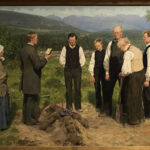“He was despised and rejected of men, a man of sorrows, and acquainted with grief.”
Handel’s Messiah, Air from Part II, quoting Isaiah 53
Being acquainted with grief does not fit the season. Or so it might seem.
Last Sunday I was in the third row from the front, drinking in every recitative, air, and chorus of Handel’s Messiah. It was an occasion to experience the power of music to convey and enhance the meaning of words.
At one point I noticed a change; I could feel a difference in the music. Perhaps I was starting to doze, but it seemed that the same line was being repeated over and over again, slowly, deliberately. The mezzo-soprano’s voice was working its way to my innards. And the words?
“…a man of sorrows, and acquainted with grief.”
Hearing the whole Messiah at Christmas-time you get more than bargained for: the whole drama of the Messiah, beginning to end. The Hallelujah Chorus, interestingly, does not mark the birth, but the resurrection. But this line of the mezzo-soprano—it seemed to be repeated almost mercilessly–left the most lasting impression. It dawned on me that Handel might have captured more than I realized.
In many ways, the older I grow, the more acquainted with grief I become. It’s all around me; it’s in me. Sometimes it seems to overwhelm. Everything.
Grief seems so un-shareable, so unbearably singular; so mine. But it need not be so. The truth of that line begins to dawn. He was acquainted with grief.
Perhaps this is not the normal fruit of listening to Handel’s Messiah. But this year when I gaze at a baby lying in a manger, cold and uncomfortable, I will hear a mezzo-soprano’s voice singing those words. And I will be grateful.
George Frideric Handel (1685-1759) composed his Messiah over the course of a few weeks in 1741.
Originally posted at Bacon from Acorns







